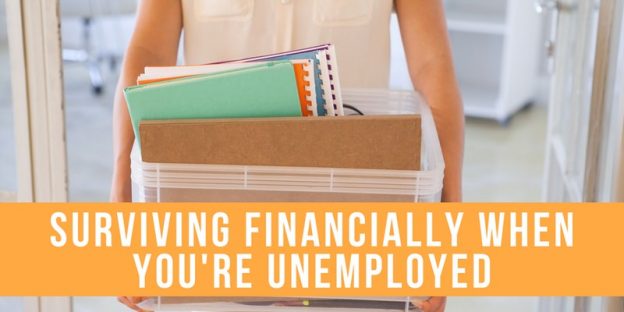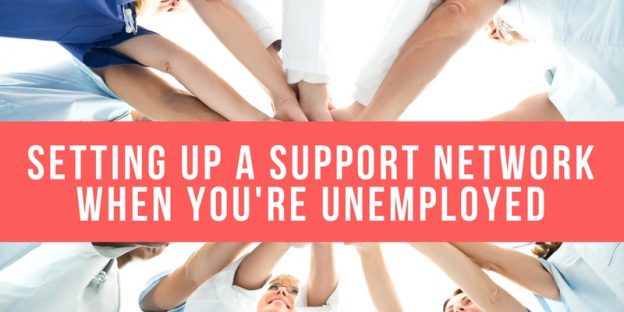What is it?
When you lose your job, you may have to put yourself on a financial diet. Just as losing weight is simple if you eat less (and exercise more), staying afloat financially is simple if you spend less. Is this process going to be easy? No, of course not. But it can be done with a little self-discipline, some creativity, and a lot of planning.

Plan for a six-month period of unemployment
It’s hard to know how long you’ll be unemployed. You may find a new job within a matter of weeks, or it may take you months. However, it’s best to plan for a worst-case scenario, probably six months. Most likely, you’ll find a job sooner, and you can throw the rest of your plan in the trash. But, if you don’t find a job quickly, at least you’ll be prepared.
Follow the plan
When you’ve come up with a financial plan, stick to it. Like any diet, you’ll be tempted to cheat by spending a little more money than you should. You may even find that as time goes by, you want to change your plan a bit. That’s OK. Your plan is designed to be flexible so that you don’t feel too burdened by something that seems unworkable.
Adjust your expectations
No, finding a new job is not going to be easy
First, despite the number of appealing job ads you see in the Sunday paper, finding a new job is not going to be easy. Even if you’re one of the lucky few that’s working in an occupation that’s in high demand, finding a new job is probably going to take at least a few weeks and maybe months. Your job search may look something like this:
- Week One: Send out ten resumes, and wait for the phone to ring.
- Week Two: Send out ten more resumes, and wait some more.
- Week Three: Send out five resumes for jobs you really want and five for jobs that you really don’t want. The phone rings. It’s your mother.
- Week Four: The phone rings. Then it rings again. You line up two job interviews. You send out three more resumes.
- Week Five: You have two interviews, and send out five more resumes. You’re called for a second interview at one of the jobs.
- Week Six: Good news! You’re hired! Bad news: You can’t start for two more weeks.
As you can see, even a successful job search can take a while, even if you’re a good candidate in a good job market. Prepare yourself for this by drawing up a financial plan as soon as you lose your job.
Expect that life is going to change
When you lose your job, you probably won’t be able to live the same way you lived when you had a job. If you try to live the same way, there’s a good chance you won’t survive financially. If you’re unemployed for only a few weeks, your life might not change radically. Perhaps you’ll only need to spend a little less on groceries, go out to eat once every two weeks instead of once a week, and then dip into your savings account. But if you’re unemployed for months, or if your basic living expenses are high, you’re going to have to take a more radical approach to survive. You may have to sell your house, your car, or take a temporary job. Prepare yourself mentally for this.
Map out your priorities
How desperate are you?
Desperation can trick you. Things that you once said that you’d never do, seem more and more appealing as time passes and you can’t find a new job. When you started your job search, maybe you said “I’ll do anything to survive, but I won’t sell my Jeep!” Four months late, you’re saying, “OK, maybe the Jeep has to go, but I’ll never disconnect my cable.” Hopefully, you’ll never reach the point where you say, “I’ll declare bankruptcy, but only Chapter 13, not Chapter 7!” After all, you do have some pride, don’t you? What are the things you will and won’t do, will or won’t sell to survive financially? At this point, do yourself a favor and map them out.
Remember, diets (even financial ones) don’t last forever
Keep in mind as you plan for unemployment that even though you’re on a financial diet, no diet lasts forever. At some point, you’ll find another job and the crisis will pass. Therefore, you want to be especially careful that the decisions you make now aren’t shortsighted. Do what you can to survive, but only do what you really have to.
Example(s): When Jeff was feeling especially desperate one day, he sold his lawn mower at a garage sale for $75. Two weeks later, he landed a job at a software company, and his lawn had grown six inches. Jeff was forced to spend $350 for a new mower.
Draft a survival budget
The next step is to draft a survival budget. If you currently have a budget, use that as a guide. If you don’t, you’ll have to start from scratch by listing all your income and expenses. A survival budget is a bare-bones version of a regular budget. What you want to end up with is an idea of what income you need to actually survive. Start by listing your expenses and your post-employment income. Remember to include only expenses that are necessary; eliminate any items that are luxuries or that you could reasonably do without.
Find ways to increase your income
There are many ways to increase your income while you look for a new job, some of which you should look into immediately, and others only when you are truly desperate.
Unemployment insurance
One of the first places you should look for income when you lose your job is your state’s employment office. However, you can only receive unemployment benefits if you meet certain eligibility criteria. Mainly, you must be involuntarily unemployed. This means that if you’ve quit your job, you have no chance of receiving unemployment benefits, but if you’ve been laid off or fired (but not for misconduct), you should definitely check into it. Benefits and regulations vary from state to state, so it’s hard to say how much you’ll get. But if your application is approved, you should begin receiving benefits quickly, often within a week or two.
Severance pay
You may be eligible for severance pay if you are laid off. How much you receive will depend upon your employer’s policy. You may have the option of receiving a lump-sum payment or a continuation of salary. If you take a lump-sum payment, you’ll have immediate control over your money, but you may lose your employee benefits. If you take a continuation of salary, you may keep your benefits, but you’ll have to trust the company that laid you off in the first place to stay financially sound.
Savings
If you’ve planned ahead, you may have an emergency fund set up that’s equal to three to six months of living expenses from which you can borrow when you need to supplement your income. This is a great source of income … if you have it. Many people don’t, and are surprised to see how fast a savings account can be depleted when it’s used as a source of funds for everyday expenses.
Credit insurance
You probably don’t have credit insurance that will make your bill payments when you’re unemployed. However, if you have any doubt, call your mortgage company, or credit card companies to find out or check your billing statements. Perhaps you inadvertently signed up for such protection, which adds a few dollars to your payment every month. However, you may have to wait for a while before receiving benefits.
Part-time or temporary job
If you get a little more desperate, you should think about taking a part-time or temporary job to supplement your income. This may be a good idea for two reasons. First, you’ll feel less stress if you know that you have at least some regular income coming in. Second, you may even be able to parlay a part-time or temporary job into a full-time job, or gain experience that will help you in your job search. Third, you’ll be able to schedule interviews relatively easily, if you can decide where or when you want to work (as you can with many temporary assignments). Even if you take a job that you feel doesn’t have career potential, you’ll feel better just doing something besides sitting around the house worrying.
Have a yard sale
Depending upon what you have to sell, having a yard sale can be quite lucrative. If you look around your house, you’ll be surprised at how much you own that you really don’t need. Make a list of things you want to get rid of, and list them in order of priority. If you’re really desperate or if you don’t care about an item, price it accordingly. If you don’t want to sell it unless you get a good price, keep that in mind as well. Also consider consigning items at a shop if you have specific things to sell.
Sell your house, or rent it
As a last-ditch attempt to remain solvent, selling your house can be advantageous if you can raise a lot of cash this way and if you want to reduce your monthly cash outlay over the long-term. It’s not a good short-term way to raise cash because it will take time to implement, and it has long-term consequences. After you accept an offer on your house, you could have trouble if you change your mind, and the impact on your family will be far-reaching. If you want to temporarily reduce what you pay for housing, however, you may want to consider moving to an apartment (or cheaper housing) and renting out your home for a year or two.
However, any decisions you make in this area should be made carefully, and only after considering the true cost of your decision and how much you can actually get out of the deal.
Withdraw money from your tax-deferred retirement account
Withdrawing money from your tax-deferred retirement account (e.g., an IRA or employer-sponsored retirement plan) is an option you should consider only as a last resort to avoid bankruptcy. In general, any money you withdraw from a tax-deferred retirement account will be taxed as ordinary income for the year in which you make the withdrawal. In addition, you may have to pay a 10 percent penalty tax for early withdrawal if you’re under age 591/2. The IRS allows exceptions to the penalty tax under certain conditions, however.
Tip: If you are considering taking funds from your IRA or retirement plan, you should consult a tax advisor regarding the specific tax treatment of your withdrawal, because not all of it will necessarily be taxable. For example, if you have ever made nondeductible contributions to your traditional IRA or after-tax contributions to your employer’s plan, a portion of your withdrawal may not be subject to tax. Also, qualifying withdrawals from a Roth IRA are totally tax free, and even nonqualifying withdrawals may not be fully taxable (since Roth IRAs are funded only with after-tax contributions).
Borrow from the cash value of your life insurance policy
If you have a life insurance policy with cash value, consider borrowing the cash reserves. You’ll have to repay the money, but not right away.
Borrow from relatives
Borrowing from relatives can be difficult. Not only will you have to put aside your pride, but you’ll also have to contend with the consequences. Your relatives may be generous, but there’s a chance that their generosity will backfire. What if you can’t pay the money back? What if you eat out one night? Will they secretly (or vocally) hold this against you? If you do borrow from a relative, clearly outline the terms of the loan in writing, if necessary. That way, you’ll reduce the chance for a future conflict.
Reduce expenses
Increase deductibles on auto insurance
Check with your insurance company to find out how much you could save per month on your auto insurance premium if you increased your deductible. However, remember that if you get into an accident, you’ll have to pay the deductible out of pocket. Will you be able to come up with a large amount of cash while you’re unemployed? Balance the risk with the benefits.
Sell your car
While many people consider a car to be a necessity, you may be able to dramatically reduce your monthly expenses by selling yours–they are expensive to drive and maintain. Not only do you have to pay for gas and upkeep, but in many cases, you also have to pay insurance premiums and monthly car payments. This can add up to several hundred dollars per month–money you could really use when you’re unemployed. Keep in mind, however, that if you have a loan on your car, you might owe more than your car is worth; if you sell your car for less than the loan balance, you’ll still have to make payments until the balance is paid off (or take out another loan to pay off the car loan balance). Also, if you get another job, you may need to buy another car, and many lenders require a certain length of employment before they give you a loan. Investigate your options thoroughly before you sell your car.
Selling your car may also be a good way to raise a large amount of cash quickly. This will depend, of course, on whether you own your car, whether you have a loan for it, and what your car is worth. Again, this is a decision to make carefully. If you have a loan, call your bank to find out the procedure to follow, because until your bank releases the title, you don’t really own the car. They can also tell you the book value of your car and your loan balance. If you own your car outright, research its value at the library or on the Internet, and decide what price to charge.
Negotiate with your creditors
If you find that you’re having trouble paying all your bills, seriously consider negotiating with your creditors. Assuming that you have good credit, you may find it relatively easy to reduce the interest rates on your credit cards, skip a payment or two on your car loan, or reduce your monthly payments temporarily. To do this, you’ll have to put aside your pride and admit that you’re having financial difficulties. You’ll be in a much better negotiating position, however, if you call your creditors before you get into financial trouble. Some creditors will turn you down, but most will negotiate with you. If you wait until you’ve already missed more than one payment and the creditors are calling you, you’ll have more trouble making your case. If you need help negotiating with your creditors or managing your debt, you may want to call a nonprofit credit counseling organization, such as the Consumer Credit Counseling Service (CCCS). For further information on CCCS, call (800) 388-CCCS.
Caution: If your creditor agrees to let you skip payments or pay reduced amounts, honor the terms of your agreement, and keep in close contact with your creditor’s representative. Otherwise, your good credit may be ruined.
Discontinue discretionary expenses
You probably pay for a lot of things you don’t really need. For instance, think about canceling magazine subscriptions, extra phone services, credit cards you don’t use that have an annual fee, health club memberships (if possible without incurring a large cancellation fee), auto club memberships, cable television, and Internet service (although this can help you find a job). You may even save a few dollars a month by switching banks if you currently pay monthly checking fees. Every little bit helps.
Tip: If you’re billed annually for some of these things, you won’t save any money unless you cancel them at renewal because you won’t ordinarily get a refund.
Limit long-distance calls
If your long-distance bills are high, put yourself on a phone budget. Vow to spend no more than a certain amount (say $25 a month) on long-distance. To keep track of your calls, keep a notebook next to your phone so that you can easily see when you’ve reached your limit.
Strategies to consider if you have more time to prepare
Often you lose your job with little warning. However, if you’re being laid off or plan to quit your job, you may have time to save money for unemployment by using the following strategies.
Establish a home equity line of credit
If you have enough time, consider establishing a home equity line of credit, if you have enough equity in your house (20 percent is often the minimum), and if you can find a bank that will loan you money without charging you closing costs. With a home equity line of credit, you’ll pay interest only on the portion you use. However, the bank may charge you an annual fee or require that you take a certain draw on the line up front. You may even be able to use the line to pay off credit cards or loans that carry a higher interest rate, and consolidate your debt. You’ll still have to make a monthly payment, however, so make sure you’ll be able to afford it before you put your house on the line. In addition, beware when lenders claim that your home equity line of credit will be tax deductible. Although this may be true in many cases, you should consult your tax advisor to find out whether it will be true in your case.
Caution: Use caution when using your house as a debt management tool. If you can’t pay your loan back, you may lose your house.
Reduce contributions to retirement or education funds
Once you know you are going to lose your job, stop contributing to any savings plans that you’ll have trouble accessing, or that aren’t necessary. These include retirement funds, education funds, and Christmas club accounts.
Decrease your withholding
Consider increasing your withholding allowances to reduce the amount that is taken out of your paycheck. Deposit this extra money in a savings account. Of course, be careful that you don’t claim more allowances than you are entitled to. When you get a new job, you should look at your tax liability for the year. It’s possible at that time that you’ll have to increase your withholding to make up the difference.
Plan a financial strategy
Once you’ve mapped out your priorities and drafted a bare-bones budget, you’re ready to come up with your own six-month financial strategy. After you’ve formulated your own strategy, post it somewhere (maybe on the refrigerator) where you can use it everyday to chart your progress.

















